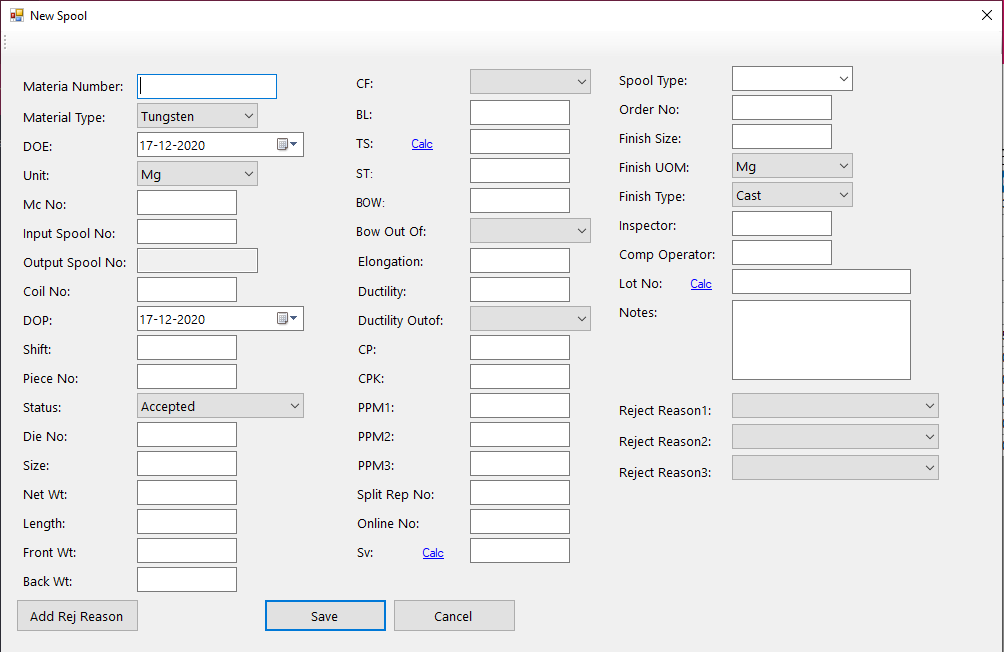Hello @ravi kumar
The following code gets a TextBox controls into a list, iterates the list and subscribes each TextBox to an anonymous KeyDown event which when ENTER is detected moves to the next control, other control types act normally.
Form code
Note thatTextBoxList is a language extension method which may appear like overkill (see the class below for the definition) but the second way below will not find all controls on a form. So you have two choices to pick from
Option 1
public partial class Form1 : Form
{
public Form1()
{
InitializeComponent();
Shown += Form1_Shown;
}
private void Form1_Shown(object sender, EventArgs e)
{
this.TextBoxList().ForEach(textBox => textBox.KeyDown += (s,ea) => {
if (ea.KeyCode == Keys.Enter)
{
ea.SuppressKeyPress = true;
SelectNextControl(ActiveControl, true, true, true, true);
}
});
}
}
Option 2
public partial class Form1 : Form
{
public Form1()
{
InitializeComponent();
Shown += Form1_Shown;
}
private void Form1_Shown(object sender, EventArgs e)
{
foreach (Control control in Controls)
{
if (control is TextBox textBox)
{
textBox.KeyDown += (s, ea) =>
{
if (ea.KeyCode != Keys.Enter) return;
ea.SuppressKeyPress = true;
SelectNextControl(ActiveControl, true, true, true, true);
};
}
}
}
}
Language extension class
Note there are wrappers for common controls
using System.Collections.Generic;
using System.Linq;
using System.Windows.Forms;
namespace MoveToNextControl.Extensions
{
public static class GenericControlExtensions
{
/// <summary>
/// Get a collection of a specific type of control from a control or form.
/// </summary>
/// <typeparam name="T">Type of control</typeparam>
/// <param name="control">Control to traverse</param>
/// <returns>IEnumerable of T</returns>
public static IEnumerable<T> Descendants<T>(this Control control) where T : class
{
foreach (Control child in control.Controls)
{
T thisControl = child as T;
if (thisControl != null)
{
yield return (T)thisControl;
}
if (child.HasChildren)
{
foreach (T descendant in Descendants<T>(child))
{
yield return descendant;
}
}
}
}
/// <summary>
/// Get all TextBoxes in a control
/// </summary>
/// <param name="control">Control to iterate</param>
/// <returns></returns>
public static List<TextBox> TextBoxList(this Control control) => control.Descendants<TextBox>().ToList();
/// <summary>
/// Get all DataGridViews controls in a control
/// </summary>
/// <param name="control">Control to iterate</param>
/// <returns></returns>
public static List<DataGridView> DataGridViewList(this Control control) => control.Descendants<DataGridView>().ToList();
/// <summary>
/// Get all ListViews in a control
/// </summary>
/// <param name="control">Control to iterate</param>
/// <returns></returns>
public static List<ListView> ListViewViewList(this Control control) => control.Descendants<ListView>().ToList();
/// <summary>
/// Get all CheckBoxes in a control
/// </summary>
/// <param name="control">Control to iterate</param>
/// <returns></returns>
public static List<CheckBox> CheckBoxList(this Control control) => control.Descendants<CheckBox>().ToList();
/// <summary>
/// Get all ComboBoxes in a control
/// </summary>
/// <param name="control">Control to iterate</param>
/// <returns></returns>
public static List<ComboBox> ComboBoxList(this Control control) => control.Descendants<ComboBox>().ToList();
/// <summary>
/// Get all ListBoxes in a control
/// </summary>
/// <param name="control">Control to iterate</param>
/// <returns></returns>
public static List<ListBox> ListBoxList(this Control control) => control.Descendants<ListBox>().ToList();
/// <summary>
/// Get all DateTimePickers in a control
/// </summary>
/// <param name="control">Control to iterate</param>
/// <returns></returns>
public static List<DateTimePicker> DateTimePickerList(this Control control) => control.Descendants<DateTimePicker>().ToList();
/// <summary>
/// Get all PictureBoxes in a control
/// </summary>
/// <param name="control">Control to iterate</param>
/// <returns></returns>
public static List<PictureBox> PictureBoxList(this Control control) => control.Descendants<PictureBox>().ToList();
/// <summary>
/// Get all Panels in a control
/// </summary>
/// <param name="control">Control to iterate</param>
/// <returns></returns>
public static List<Panel> PanelList(this Control control) => control.Descendants<Panel>().ToList();
/// <summary>
/// Get all GroupBoxes in a control
/// </summary>
/// <param name="control">Control to iterate</param>
/// <returns></returns>
public static List<GroupBox> GroupBoxList(this Control control) => control.Descendants<GroupBox>().ToList();
/// <summary>
/// Get all Buttons in a control
/// </summary>
/// <param name="control">Control to iterate</param>
/// <returns></returns>
public static List<Button> ButtonList(this Control control) => control.Descendants<Button>().ToList();
/// <summary>
/// Get all NumericUpDown controls in a control
/// </summary>
/// <param name="control">Control to iterate</param>
/// <returns></returns>
public static List<NumericUpDown> NumericUpDownList(this Control control) => control.Descendants<NumericUpDown>().ToList();
/// <summary>
/// Get checked CheckBox if any from a control/container
/// </summary>
/// <param name="control">Control to iterate</param>
/// <param name="pChecked">true or false</param>
/// <returns></returns>
public static RadioButton RadioButtonChecked(this Control control, bool pChecked = true) =>
control.Descendants<RadioButton>().ToList()
.FirstOrDefault((radioButton) => radioButton.Checked == pChecked);
/// <summary>
/// Get a list of RadioButtons
/// </summary>
/// <param name="control">Control to iterate for RadioButtons</param>
/// <returns></returns>
public static List<RadioButton> RadioButtonList(this Control control) => control.Descendants<RadioButton>().ToList();
/// <summary>
/// Get control names for container e.g. a form, a GroupBox etc.
/// </summary>
/// <param name="controls">Control to iterate</param>
/// <returns></returns>
public static string[] ControlNames(this IEnumerable<Control> controls) => controls.Select((control) => control.Name).ToArray();
}
}




